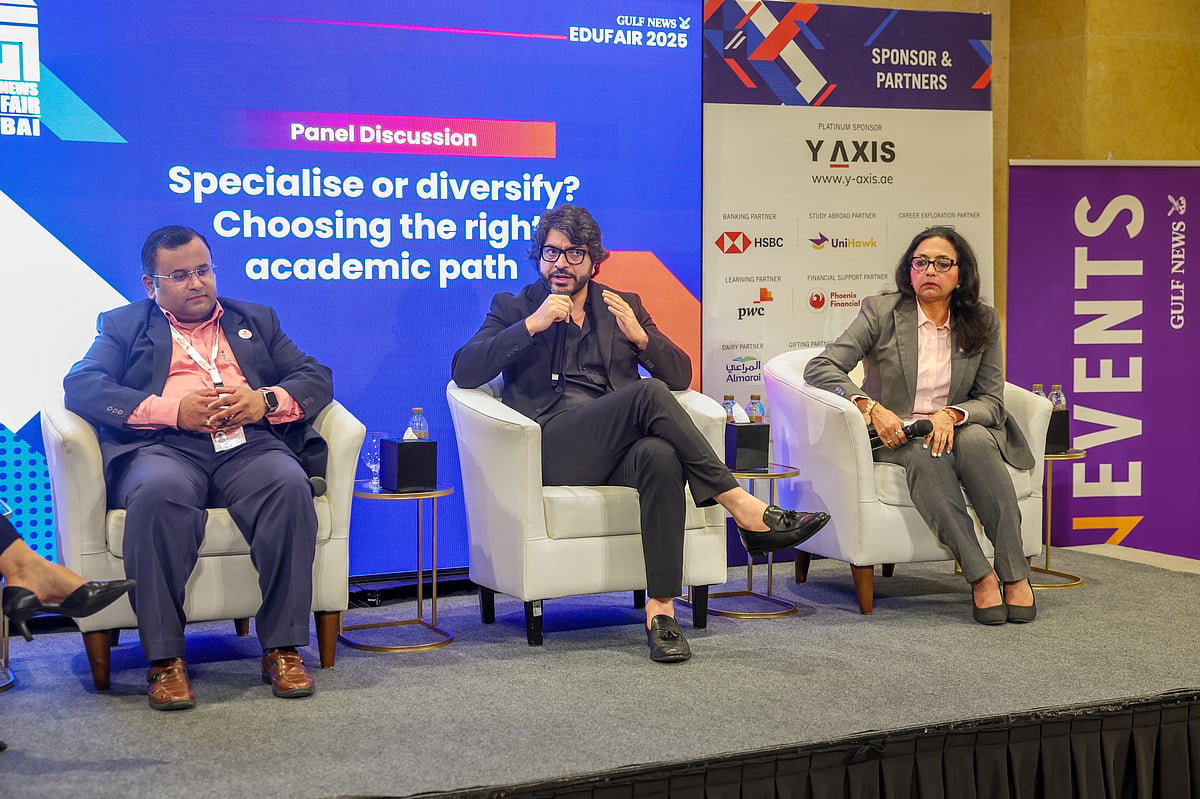Gulf News Edufair Dubai: Universities urge students to balance expertise with adaptability
Specialisation must be supported by ongoing skill development

Specialisation is essential in today’s job market, but a wider academic foundation is becoming just as important, panelists noted during a discussion titled Specialise or diversify? Choosing the right academic path at Gulf News Edufair.
As subject areas expand and increasingly intersect, there is growing demand for professionals who combine in-depth knowledge with cross-functional insight. Panelists highlighted the rise of T-shaped graduates who offer both focused expertise and adaptable thinking.
Begin with depth, grow with breadth
Dr Sartaj Rasool, Associate Professor and Head, Department of Management Studies, BITS Pilani Dubai Campus, and Dr Vidya Nandagopal, Director, Center for Executive Development at University of Dubai pointed out that specialisation plays a key role in early career success, but long-term growth demands broader capabilities.
“Specialisation is the need of the hour – it drives innovation and helps develop deep, relevant skills,” said Dr Rasool.
“You may enter a job as a specialist, but growth, especially into leadership or strategy roles, requires broader knowledge. To grow into leadership, you must understand all the departments within the organisation. That means learning beyond your core area.”
Dr Nandagopal echoed the view. “Specialisation helps you land your first job. But as your career progresses, you’ll need to build additional skills, like leadership, coaching, and communication,” she explained.
“For example, an engineer may get hired due to deep technical expertise, but to become a tech lead in the company, they’ll need to manage people and drive cross-functional collaboration.”
Meanwhile, Santosh Gopalkrishnan, Head of Academics, Symbiosis International University, Dubai advised students to start with a general academic base before thinking about specialisations.
“At the entry level, I recommend choosing a more generalised programme. As you progress to the Master’s level, that’s when you should focus on specialisation and build expertise,” Gopalkrishnan suggested. “Once you’re clear about what aligns with your career goals and industry trends, your academic path becomes much more focused and strategic.”
All panelists, however, agreed that specialisation must be supplemented with broad-based education and ongoing skill development. Lifelong learning was described as a non-negotiable aspect of modern careers.
“Learning doesn’t stop with a degree,” said Dr Nandagopal. “After your four-year programme, there will always be more certifications and skills to acquire.”
Micro-credentials and meta-skills
To stay relevant, students are increasingly turning to micro-credentials that complement their main degree and offer flexibility across industries.
“Micro-credentials are typically designed around actual job roles. You start with a job description and build the credential to guide someone through the key aspects of that role,” Dr Nandagopal explained. “That’s why they’re so flexible; you can even combine them across disciplines to gain experience in fields that may seem unrelated, but are increasingly connected in today’s job market.”
Gopalkrishnan also highlighted how micro-credentials can guide students towards specific careers: “These add significant value and often become the focal point that guides students towards a specific career or even a particular industry.”
T-shaped professionals on the rise
Panelists highlighted the growing importance of the T-shaped professional – someone who combines broad, transferable skills with deep expertise in one area.
“A T-shaped professional is someone with broad, cross-functional skills and deep expertise in one area,” said Gopalkrishnan. “This balance is essential. Graduates need both versatility and specialisation to stay competitive in the job market.”
Skills that set you apart
The discussion also covered key professional traits that are increasingly in demand.
“Soft skills, like communication, teamwork, and emotional intelligence, are essential when transitioning into management or cross-functional roles,” Dr Nandagopal pointed out. “The top meta-skill is learning agility. It’s about staying open, adaptable, and always ready to learn new things.”
Dr Rasool added, “Students must keep widening their skills. The ability to apply your core knowledge across multiple domains is what keeps you relevant in the industry.”
Experts agreed that being able to collaborate and transfer knowledge across disciplines is essential.
The entrepreneurial edge
Today’s employers expect more than technical know-how. They look for employees who take initiative and ownership.
“An entrepreneurial mindset means taking ownership of your role and constantly looking for ways to improve productivity, support your team, and drive change,” said Dr Nandagopal. “That’s what employers seek today, not just someone clocking in from nine to five.”
Sign up for the Daily Briefing
Get the latest news and updates straight to your inbox
Network Links
GN StoreDownload our app
© Al Nisr Publishing LLC 2026. All rights reserved.